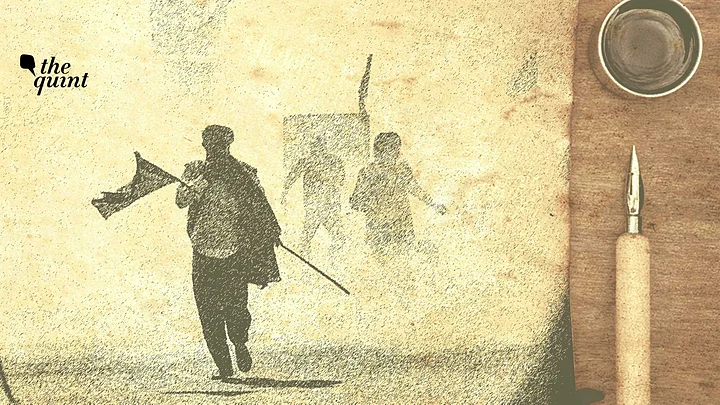There is a moving library for the reading interests of the protesting farmers and their supporters on the Punjab-Haryana highway. Elsewhere, they were quoting Bhagat Singh: “Inquilab Zindabad, Samrajyawad murdarabad (Long Live revolution, down with imperialism)”.
Even as history is being made, history is being revisited.
Alongside the religious chant of “Wahe guruji da khalsa, wahe guruji di fateh (O God’s one, victory to God)”, the atheist anti-colonialist Bhagat Singh is inspiring the revolt in a free democratic India.
Protests rely on words as much as on intent. Reports claim that songwriters had, in fact, prepared the blueprint for the farmers’ agitation. While some verses spoke of the betrayal by the government, a random few were more blasé about replacing the spade with the gun, and chopping off the feet of any outsider who dared to step on their land.
Writers in an agitation often employ shock value to make a statement. The point here is: where are the authentic voices?
‘Hum Dekhenge’
The question isn’t restricted only to this movement. During the anti-CAA protests at Shaheen Bagh, “Hum dekhenge” became the anthem. This nazm by Pakistan’s unofficial poet laureate Faiz Ahmed Faiz throws a challenge at the establishment – “We shall see, and await the day when the mountains of tyranny dissipate like cottonwool”.
He used Quranic imagery, which made perfect sense to taunt the powerful about their moral perfidy in an Islamic Republic. In India, it created a schism.
The authorities at IIT-Kanpur, where it was (also) recited, set up a panel to investigate whether it was ‘anti-Hindu’. As cocking a snook to the establishment, the recitation worked, but on many podiums the chant was reduced to a pantomime.
While good literature can resonate across cultures, I wonder though, why nobody thought of quoting from the works of the India-based luminaries from the Progressive Writers’ Movement? Ali Sardar Jafri’s Utho was a clarion call to the revolutionaries to rise along with the farmers and labourers, to ignite the spark and toy with shackles:
“Utho hind ke baghbaanon utho
Utho inquilabi jawanon
Kisanon utho kaamgaro utho
Nayi zindagi ke shararon utho…”
Of ‘Outside’ Voices & ‘Soft-Focus’ Dissent
A few new poets did emerge, but they came across as ‘outside’ voices. And, in a couple of cases, where the verses spoke of visiting temples as well as mosques and reciting the Gayatri Mantra, the poems became a mockery of the dissent against a law that would mainly affect Muslims. What is the validity of “Kaaghaz nahin dikhayenge (we shall not show you our identity papers)” when you choose to kowtow to the majoritarian identity?
The soft-focus nature of such dissent becomes evident when you compare it to revolutionary contemporary Kashmiri poetry and the Dalit poets’ ability to rattle the government.
The Kabir Kala Manch members use satire and name names. The National Investigation Agency (NIA), while arresting three of them for allegedly having ‘links’ with Naxals, also cited the digs they made at the prime minister: “My name is Bhaktendra Modi. My speech is simple. My living is simple. And the coat is also one in lakhs. Hey, who is here? Don’t pay attention to the opposition… but, if anybody comes after me, his elimination is certain.”
Ever-Present Threat Of Incarceration: No Room For Political Muscularity Of Protesting Writers?
The threat of incarceration is always present, whether you pen the words of a rebellion or you don’t. Some years ago, the poet Mirza Ghalib was accused of inspiring violence among members of SIMI (Students’ Islamic Movement of India), a banned organisation, with this verse: “Mauje khoon ser se guzar hi kyon na jaaye/Aastane yaar se uth jaaein kya!”
The Maharashtra Police’s affidavit noted that it ‘encouraged bloodshed’. Khalid Mehmood, of Jamia Millia Islamia’s Urdu department, had transliterated it as “Whatever be the circumstances, we shall not desert our land, come what may, even if our heads are separated from our bodies”.
Were the couplet indeed about bloodshed, as are many works of art and literature, could it incite hate after all these years?
And would it be wrong for a writer to respond to hate that is more immediate, more potent? Isn’t there room for the political muscularity of writers standing up in revolt?
How History Will Be Recollected
If we speak of literary muscularity, then Kashmir breathes it because it has been targeted by the real thing. MC Kash’s rap personifies the hurt of a rebellion gone on for too long. He slices his verbal knife deep:
“I come from the land of bloody crackdowns
where silhouettes of life rush to the playgrounds...”
There is no obfuscation, no ‘we will show you’ bravado. It has the incessant knock of urgency, and given the short attention spans today, this is probably how history will be recollected – a sum of jokes, scrawls on walls, and the sound of a verse slammed into our consciousness.
(Farzana Versey is a Mumbai-based writer. She tweets at @farzana_versey. This is an opinion piece and the views expressed are the author’s own. The Quint neither endorses nor is responsible for them.)
